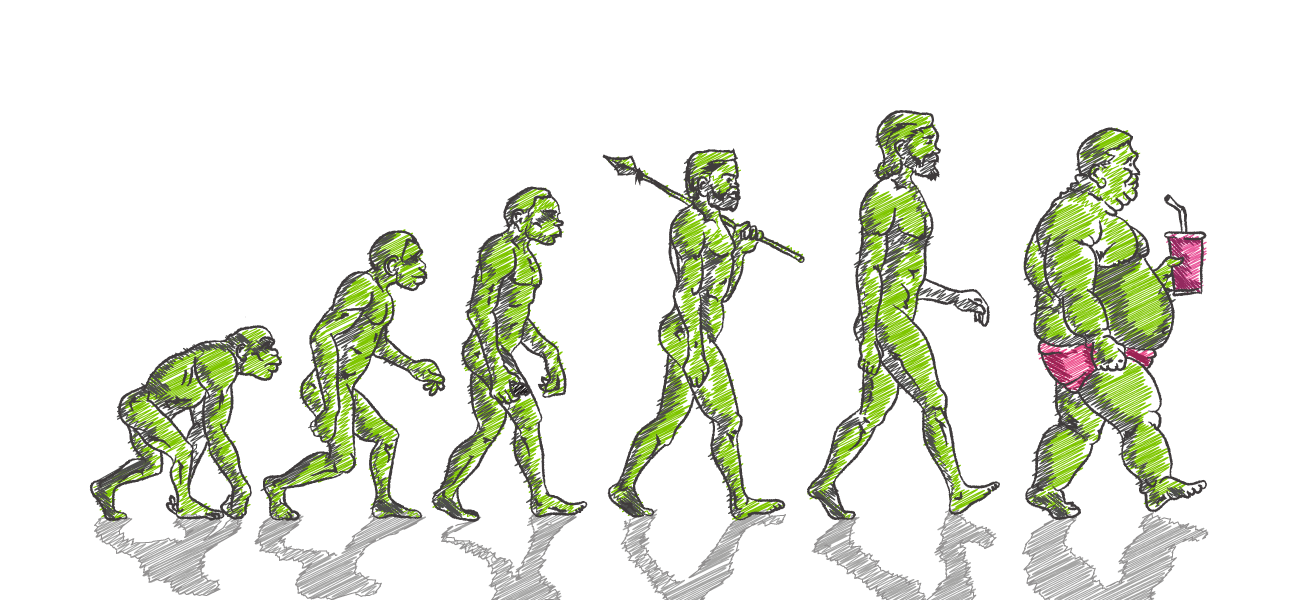|
16M years ago, our common ancestors were European apes living in subtropical Europe. A major global climate change occurred, cooling and altering the environment in which they lived. Evolution in its brilliant but blind way, adjusted and left man to evolve with a genetic change that is now haunting us. The change was a progressive sequence of loss of function mutations that rendered an enzyme called uricase inactive and allowed uric acid levels to soar in these apes, and everything that followed in their evolutionary line.
Uric acid, in so much as you have ever heard or thought of it, is likely linked in your mind as the compound that in excess triggers gout. When we think of gout, images of Henry VIII eating a drumstick, gorging himself with meat and alcohol come to mind. Acute gout, the process where uric acid crystallizes within the joints, strangely enough most commonly at the base of the big toe, was until the 20th century largely the disease of kings. Only the very wealthy could afford the lifestyle of excess that allowed uric acid levels to soar and subsequently crystallize. In the latter half of the 20th century, the incidence of gout, and other uric acid related diseases, has begun to soar as Western diets - high in purine proteins (meat & seafood) and beer has become more common. The real culprit though is likely the increase of dietary fructose from added sugars. But I'm getting ahead of myself... What is unusual about gout is that it is a human disease - in fact, most mammals have very low levels of uric acid because they have the enzyme uricase that converts uric acid into a more water soluble form that is easily excreted by the kidneys. In addition to gout, elevated uric acid is also associated with hypertension, endothelial dysfunction, metabolic syndrome, kidney and liver disease. So why would evolution have humans lose such a key enzyme? Evolutionary scientists have some ideas, as they have traced the uricase mutation to European apes living in subtropical Europe 16M years ago. At that time, these apes, who were our ancestors, thrived in subtropical Europe on a diet predominantly consisting of fruit. A global cooling event at that time caused a rapid decrease in the availability of fruit in Europe and was the likely trigger for the mutation. This is where it gets really interesting - one of the metabolites of fructose is uric acid, increases in uric acid cause a shift in mitochondrial metabolism, and result in increased fat storage. At times of stress, where fructose consumption was going down, increasing fat storage would be a desirable effect, increasing the likelihood of survival. Higher uric acid levels contribute to greater fat storage. At the same time, with decreases in fruit availability, Vitamin C consumption would have decreased for these apes. Vitamin C is a powerful anti-oxidant and one that apes would rely on. One paradox of metabolism is that we need oxygen to generate energy from food but oxygen is highly reactive and through the creation of reactive oxygen species (ROS) damages cells and DNA - this toxicity related to oxygen is called oxidative stress and is associated with over 100 different diseases. To protect against oxidative stress - we have through evolution developed many protective strategies - including Vitamin E, beta carotene, glutathione, Vitamin C and .... uric acid. Interestingly, uric acid is a powerful anti-oxidant and provides almost 50% of our circulating anti-oxidant capability. So as Vitamin C levels went down, due to decreased fruit consumption, secondary to global cooling, from a survival basis a mutation that increased uric acid levels to essentially replace the antioxidant capacity lost from decreased Vitamin C levels makes sense. Ironically, our ability to synthesize Vitamin C was previously lost in evolution - perhaps in response to plentiful dietary "C" from fruits! A third survival benefit to the loss of uricase relates to uric acid's ability to maintain blood pressure in a low salt environment, which may have also been a by-product of the climate changes 16M years ago. This blood pressure effect may also have been instrumental in enabling humans to walk on two legs with their heads significantly above their hearts. Evolution selects for mutations that increase survival in the presence of threatening environmental challenges (this is natural selection):
But what happens when modern living dramatically changes the food environment?
What happens is that our genes work against us, and in our current food environment, uric acid levels are soaring resulting in soaring rates of chronic diseases:
Our genes through natural selection are matched to our environment - the tragedy of modern life is that in less than 100 years, we have created evolutionary mismatches across all key human behaviors: nutrition, exercise, sleep, stress tolerance, relationships and purpose. The bad news is that these mismatches are responsible for much of the epidemic of chronic disease that we face. The good news is that we, as individuals, have the ability to make choices that better match our genes. In the case of uric acid, eliminating fructose from added sugars and high fructose corn syrup and consuming alcohol in moderation are the places to start. Maintaining healthy proportion of protein (around 20% of calories), hydrating as well as consuming enough Vitamin C from foods. Bottom Line: Synopsis: Evolution has led humans to have high levels of uric acid (relative to other mammals). The benefits of the evolutionary change are challenged by the hyper caloric, high fructose world we live in now - resulting in high levels of obesity and soaring uric acid triggering metabolic syndrome, hypertension, endothelial dysfunction, and worsening Type II Diabetes. What to Do:
If you feel that you need help, please book a free consultation with us to learn more. |
AuthorDr. Brendan Byrne Categories
All
|

 RSS Feed
RSS Feed
